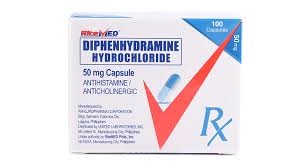University Of California Study Shows That Common OTC Antihistamines Such As Diphenhydramine Can Help Alleviate Certain Long COVID Symptoms
Source: Long COVID Treatments Feb 10, 2022 3 years, 2 months, 3 days, 5 hours, 36 minutes ago
Long-COVID-Treatments: A new study by researchers from University of California-Irvine has shown that common over the counter (OTC) antihistamines such as diphenhydramine can help alleviate certain long COVID symptoms.

Long COVID or PASC (Post-acute sequelae of SARS-CoV-2 infection) is an emerging global health crisis, variably affecting millions worldwide.
It is currently estimated that anything between 32 to 87 percent all those who have been exposed to the SARS-CoV-2 virus irrespective of whether they were asymptomatic or symptomatic or only had mild symptoms will ultimately develop some form of long term medical or health condition, some of which can be not easily detectable and might not show any visible manifestations but can have fatal outcomes.
To date, there are no treatment protocols for Long COVID that has been established.
The
Long COVID Treatments study team reports 2 cases of long COVID in response to opportune administration of over-the-counter antihistamines, with significant improvement in symptoms and ability to perform activities of daily living.
The stud team advocates that more detailed studies are warranted to understand the potential role of histamine in the pathogenesis of long COVID and to explore the clinical benefits of antihistamines in the treatment of long COVID.
In the case reports, 2 patients, previously healthy middle-aged women who developed signs and symptoms consistent with long COVID in early 2020, reported near complete resolution of symptoms after administration of over-the-counter histamine antagonists such as diphenhydramine. These case reports are consistent with recent studies showing endothelial injury and aberrant immune response with histamine release during COVID-19.
The study findings were published in the peer reviewed journal: the Journal for Nurse Practitioners.
https://www.npjournal.org/article/S1555-4155(21)00547-X/fulltext
The study findings indicate that antihistamines may provide relief for the millions of individuals suffering from the painful, debilitating symptoms of long COVID-19 that impair daily functioning.
Considering that to date, according to official figures, more than 403 million people globally have been infected with the SARS-CoV-2 virus although realistic figures could be about four-fold or about 1.2 billion people, the burden of long COVID on the public healthcare system around the world is devastating.
The long COVID symptoms affecting individuals range from mild symptoms to several weeks or months of illness including ailments such as brain fog, joint pain, exercise intolerance and fatigue.
Many long COVID patients wish more than anything that they could work and do the most basic activities they used to before they got sick with the condition.
Many long COVID patients are desperately searching for something to help them get back on their feet. Currently, there is no cure for Long COVID, only symptom management.
Numerous therapeutic options are being explored, with antihistamine
s being one of them.
Corresponding author, Professor Melissa Pinto, a University of California-Irvine associate professor told Thailand
Medical News, “The possibility that an easy-to-access, over-the-counter medication that is extremely cheap could ease some of the long COVID symptoms should offer hope to the estimated 120 million people worldwide who have been in distress for months or even years.”
The case reports describe two healthy, active middle-aged women with Long COVID who found, by chance, that antihistamines led to greatly enhanced daily function, now sustained for almost a year.
Both long COVID patients took over-the-counter antihistamines such as diphenhydramine to treat other conditions ie the first one had triggered her dairy allergy by eating cheese, and the other had run out of the allergy medication she usually took and experienced improved cognition and much less fatigue the next morning.
Interestingly, the first woman's long COVID-19 symptoms also included exercise intolerance, chest pain, headaches, a rash and bruising, while the second coped with joint and abdominal pain, as well as the rashes and lesions known as "COVID toes."
Interestingly, in the first case, the woman didn't take another antihistamine for 72 hours; when her symptoms reappeared, she took the medication and again found relief. With guidance from her primary healthcare provider, who prescribed her an antihistamine, she began a daily dosage that has significantly decreased her other long COVID-19 symptoms. She reported that she has regained 90 percent of her pre-COVID-19 daily function.
It was reported that in the second case, the woman took a different over-the-counter antihistamine as a substitute for what she had taken for years to manage her seasonal allergies. (She took diphenhydramine this time). After noting that her long COVID-19 fatigue and cognition had improved, she continued to take it daily along with her previous allergy medicine. Her course of treatment, which now includes both over-the-counter medications, has also significantly reduced her additional long COVID-19 symptoms. She reported that she has regained 95 percent of her pre-illness functioning.
Past studies have similarly shown the potential benefit of antihistamines as treatment for Long COVID.
https://www.frontiersin.org/articles/10.3389/fphar.2021.633680/full
https://www.sciencedirect.com/science/article/pii/S1094553920301462
https://link.springer.com/article/10.1007/s00011-020-01422-1
Professor Pinto added, "Most patients tell us that providers have not recommended anything that has helped. If patients wish to try OTC antihistamines, I urge them to do so under medical supervision. And because providers may not know about new potential treatments, I would encourage patients to be active in their care and consider taking research and case reports like ours to appointments with providers so they can help create a regimen that will work. The next steps for this research into antihistamine treatment are to conduct broad-based trials in order to evaluate efficacy and to develop dosage schedules for clinical practice guidelines."
For the latest on
Long-COVID-Treatments, keep on logging to Thailand Medical News.
